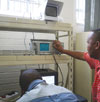

Dramatic changes expected for security industry training in 2011.
The first major change expected is the reallocation of responsibilities between SAQA (South Africa Qualifications Authority), the SETAs (Service Sector Education and Training Authorities) and a new body called the Quality Assurance Council for Trades and Occupations (QCTO).
“This shift is due to the replacement of the 1995 SAQA Act with the 2008 Skills Development Amendment Act.” says Neil Gillespie, training manager for Elvey Security Technologies.
The QCTO was formed in February 2010 and is expected to be operational from April 2011. The QCTO falls under the Department of Higher Education and Training and is expected to bring about a number of changes in the vocational training arena. On paper these look positive, but ultimately effectiveness will depend on how well these are implemented.
Another change that is expected to impact on the security industry and especially the electronic security industry is an amendment to the Private Security Industry Regulation Act, 2001. While this Act prescribes training as a requirement for persons entering and operating in the security industry, current prescribed training requirements are focused on guarding and are not relevant to all sectors in the security industry. This amendment is expected to prescribe relevant training to the various sectors. “This will result in new training requirements for all persons operating in the electronic security sector, this includes sales and management staff,” says Gillespie.
It is expected that persons operating in these sectors, already registered with PSIRA (Private Security Regulatory Authority), will be given a grace period to meet these amended training requirements. The old guarding sector grade E to Grade B requirements will still be recognised, but the new unit standard-based grades will replace the old curriculums for all new training.
“There are two ways to obtain accreditation for the amended training requirements,” explains Gillespie, “the first of these is to attend accredited training and while this can be effective, it can often be costly and time consuming. The second way to do this is called Recognition of Prior Learning (RPL). In terms of RPL each person wishing to be accredited would need to submit a POE (Portfolio of Evidence) to SASSESTA for evaluation. The POE is similar to a CV and needs to detail all relevant training attended and work experience.
While no date has been provided by PSIRA for the Act to be amended, it is critical that parties working in non-guarding sectors of the security industry start preparing for this amendment to avoid the rush once this has been implemented.
For more information contact Elvey Security Technologies, +27 (0)11 401 6700, [email protected], www.elvey.co.za
| Tel: | +27 11 401 6700 |
| Email: | [email protected] |
| www: | www.elvey.co.za |
| Articles: | More information and articles about Elvey Security Technologies |
© Technews Publishing (Pty) Ltd. | All Rights Reserved.